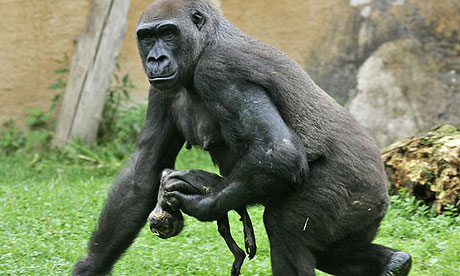 We can easily look at this picture of Gana the mother Gorilla carrying her dead baby and see the loss in her face. But, are we simply projecting human emotions onto her, imagining her grief as the only explanation for behavior we can’t understand? Individual animals and packs are often spotted displaying such behavior, and zoologists are still trying to determine the psychology of it.
We can easily look at this picture of Gana the mother Gorilla carrying her dead baby and see the loss in her face. But, are we simply projecting human emotions onto her, imagining her grief as the only explanation for behavior we can’t understand? Individual animals and packs are often spotted displaying such behavior, and zoologists are still trying to determine the psychology of it.
Despite some skepticism, according to Psychology Today, that animals experience grief is undeniable; it is simply a question, perhaps, of why they have evolved to experience this and other emotions. Their article, Grief in Animals, describes a number of instances of grieving animals, wild and captive. After the loss of relatives and companions, primates, mammals, and even waterfowl display behavior that mirrors the depression and grief seen in humans. They become docile, solitary; they stop eating; they’ll bury their dead, even perform funeral rituals.
Signs of grief in animals are similar to those in humans. Wild or captive animals and pets will long for a lost companion. Animals in the wild often search for a lost member of the group if they did not see the death or the body, and pets and animals in zoos will stare longingly as if waiting for the return of the deceased companion. Many animals experience loss of appetite and show the same physical signs of grief as humans: sunken eyes, lethargy, illness and weakness due to malnutrition.
Take a look at just a handful of heart-wrenching and almost unbelievable stories of animal grief:
- A female fox buries her slain companion.
- A female dolphin is spotted carrying a dead calf.
- A mother gorilla is photographed carrying the body of her deceased three-month-old infant.
- More than a dozen chimpanzees in a zoo stand in silence as a fallen companion is carried away.
- Wild and captive elephants perform some of the most profound grief rituals.
- A llama dies of grief after the death of her companion to old age.
In defense of the evolutionary reality of grief in animals, The Guardian points out that “evolution favours any species with strong enough parental instincts to see their young through infancy.” It stands to reason, therefore, that animals will experience grief or guilt at the loss of offspring. Many animals, such as chimpanzees, bonobos, elephants, various bird species, dolphins, and many more, have highly-sophisticated social structures. As it is within a society of humans, the death of a member of a social group of animals will disrupt this structure. It is not unfathomable that animals in such a situation will experience grief, just as humans do, at the loss of a member of their group. Though the evolutionary necessity for grief has yet to be explained, evidence of grief and depression in animals seems undeniable– and absolutely touching to those of us looking on.
SOURCES:
Psychology Today. “Grief in Animals: It’s arrogant to think we’re the only animals who mourn”. 10/29/09. www.psychologytoday.com
The Guardian. “Do Animals Feel Grief?” 8/20/08. www.guardian.co.uk

 Do Animals Experience Grief?
Do Animals Experience Grief?


 “As Tears Go By” by Marianne Faithfull
“As Tears Go By” by Marianne Faithfull

 Funeral Favors Offer Visitors a Tangible Memento
Funeral Favors Offer Visitors a Tangible Memento















